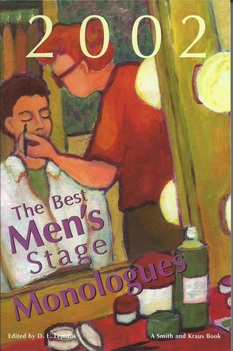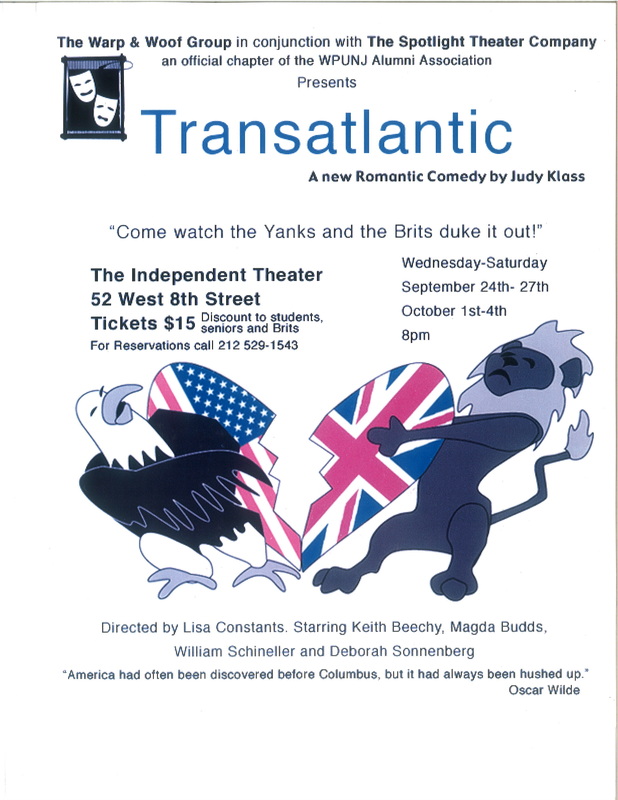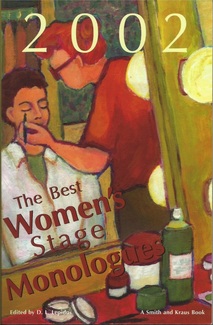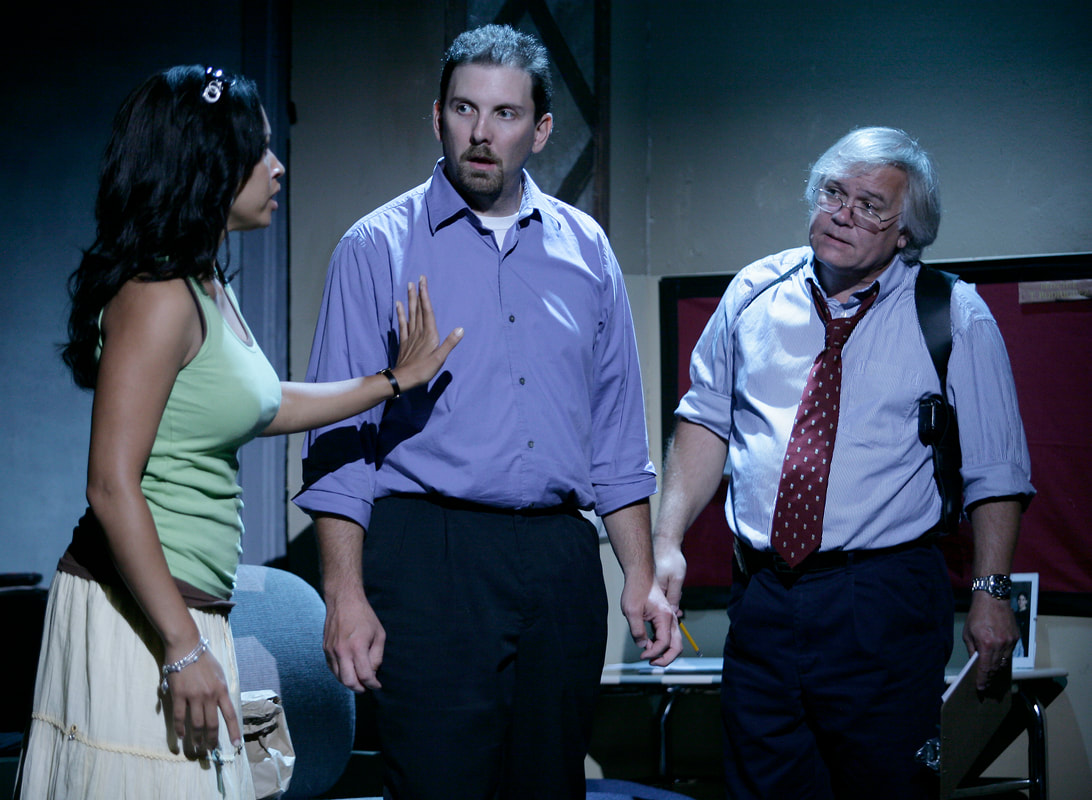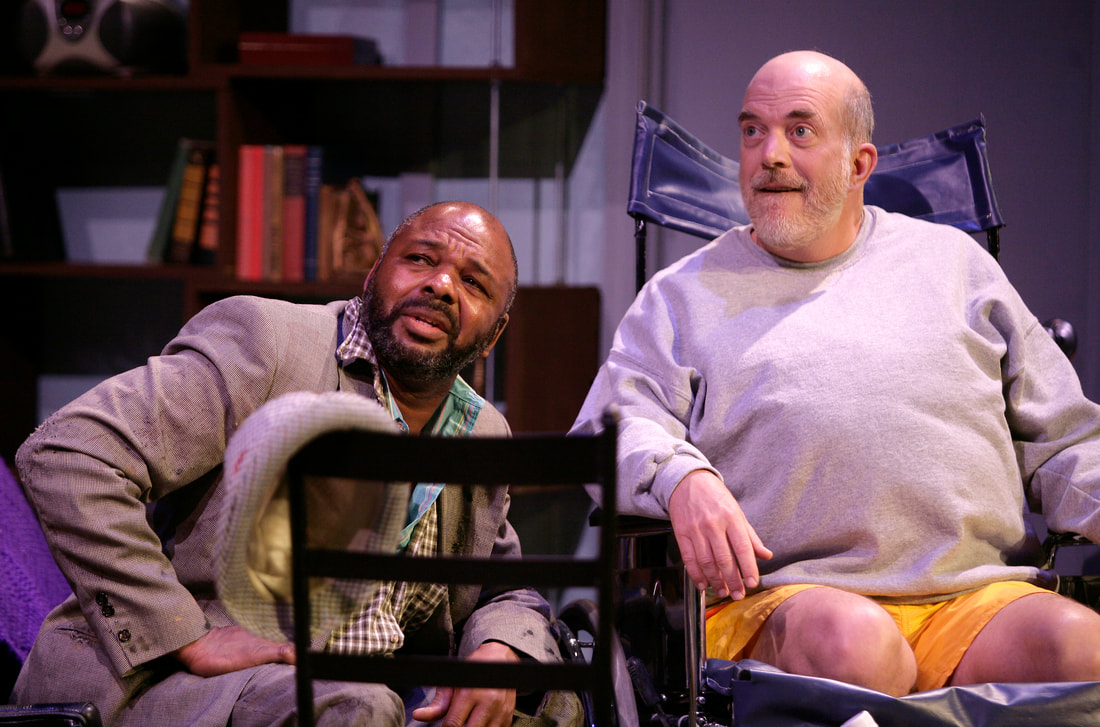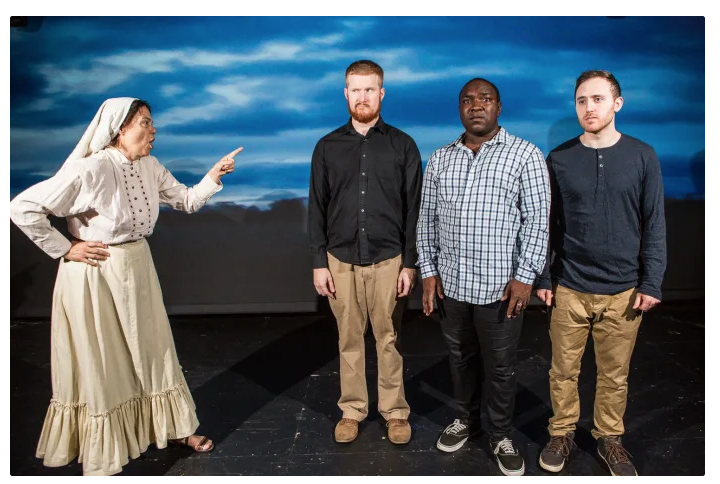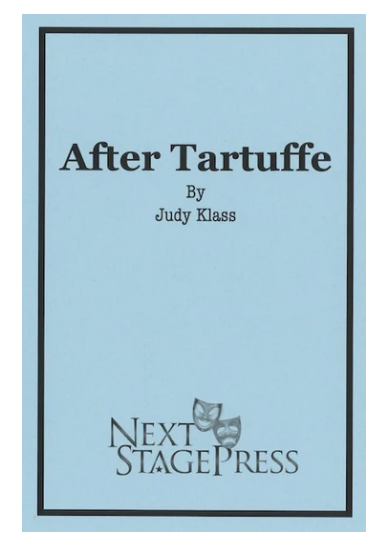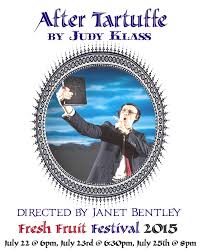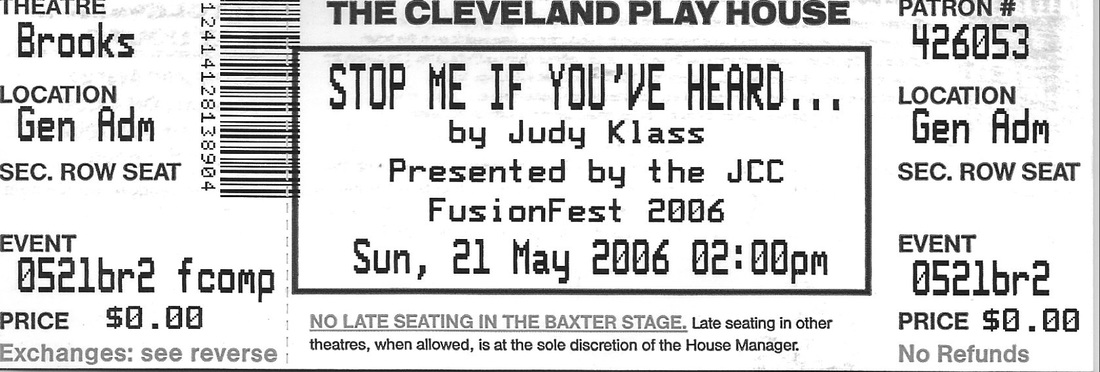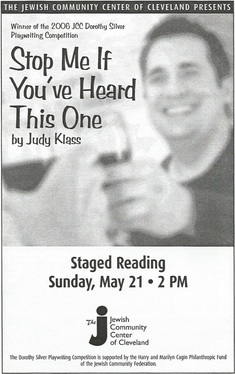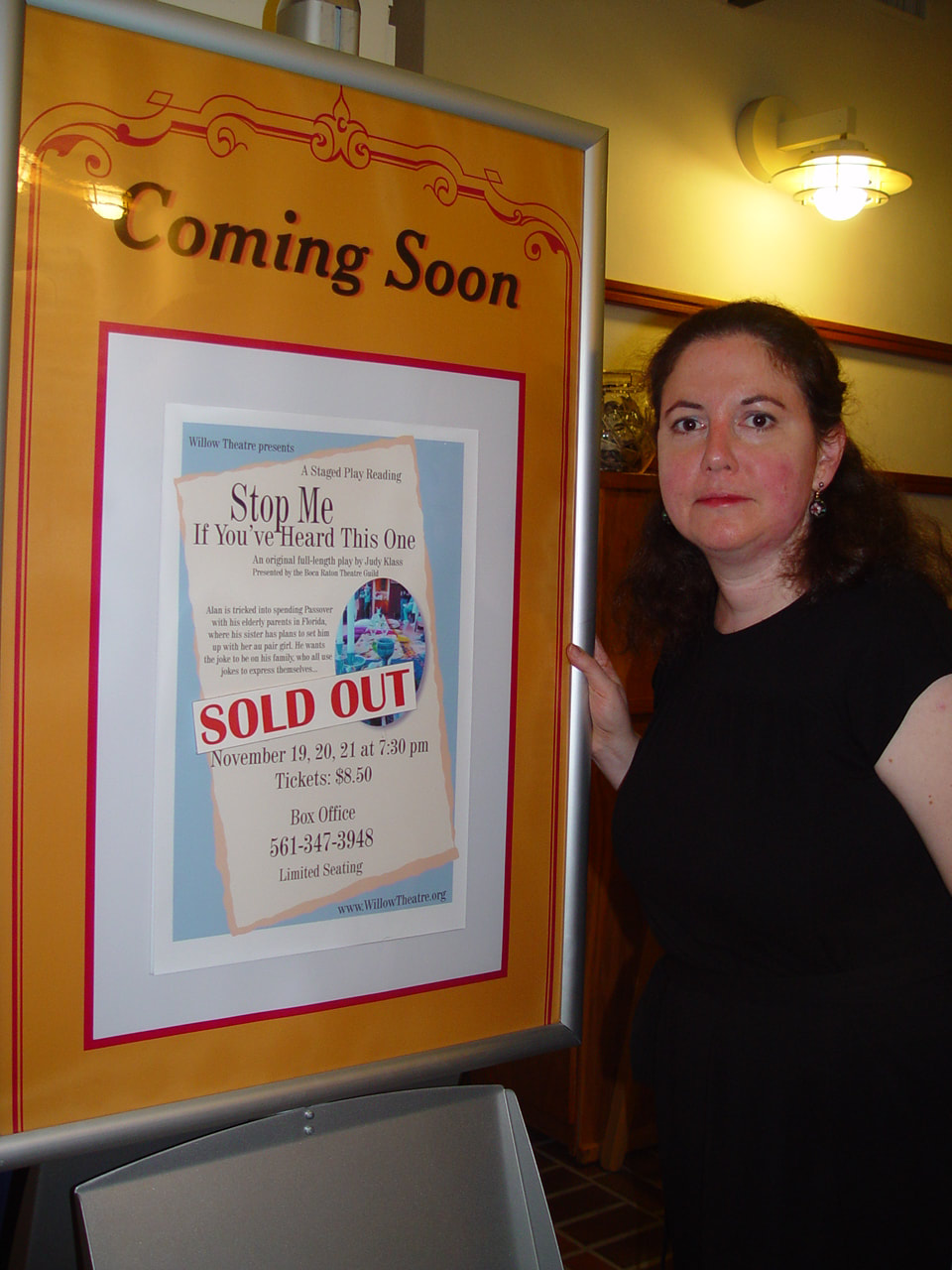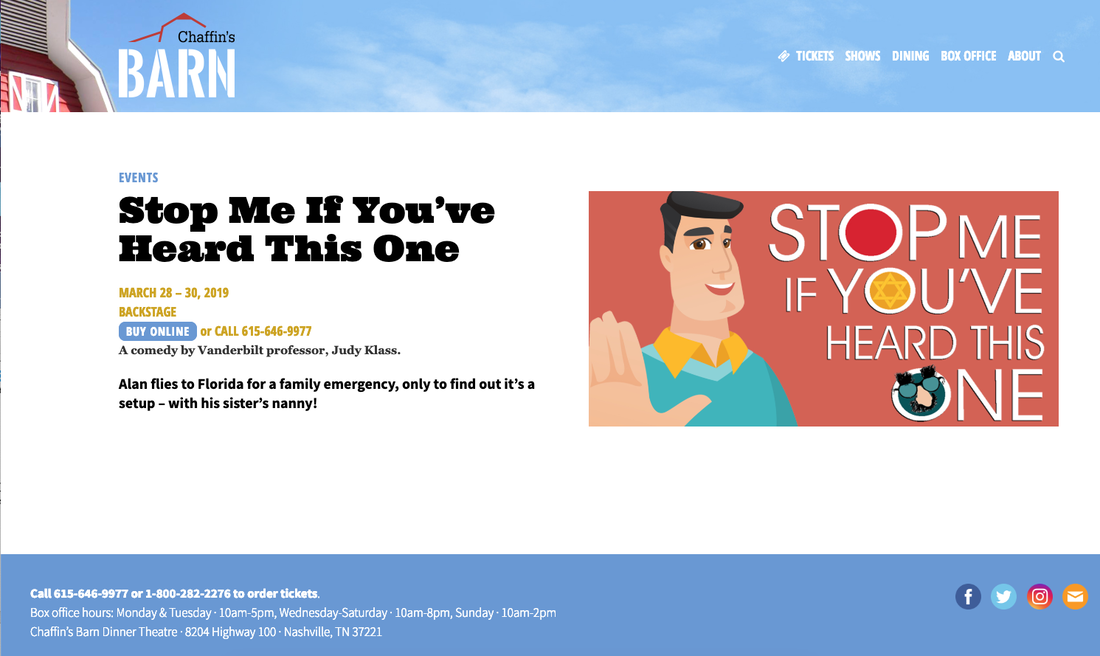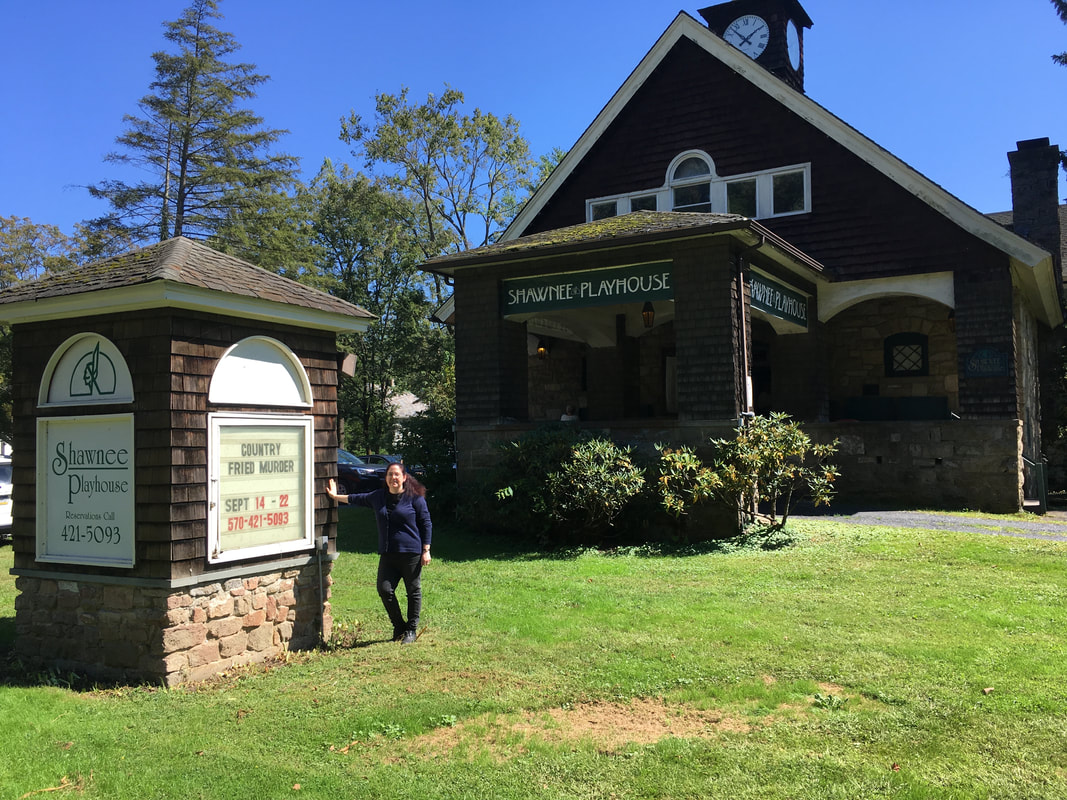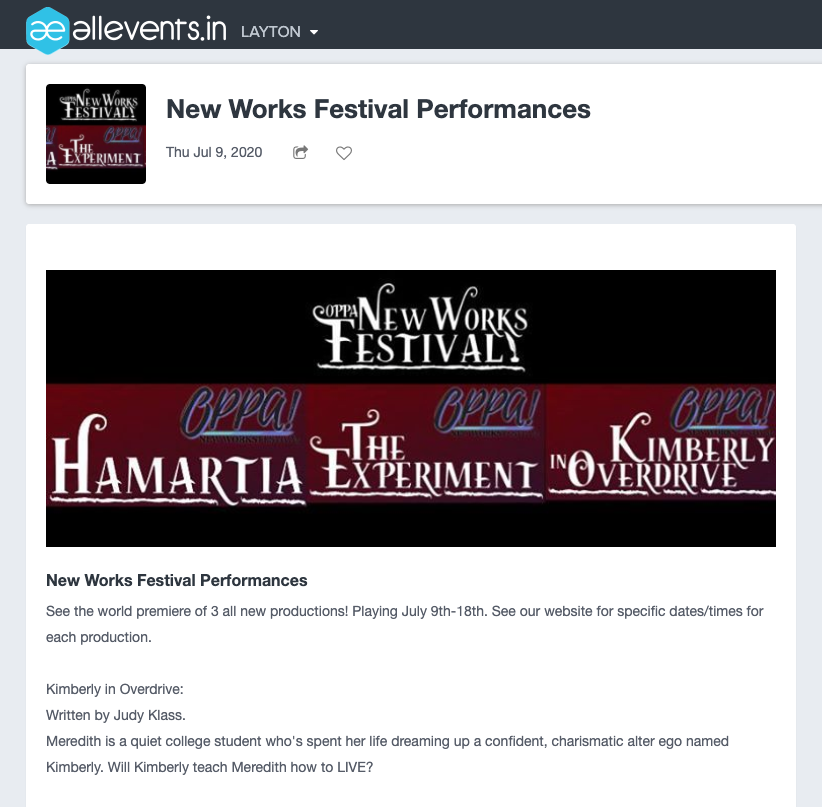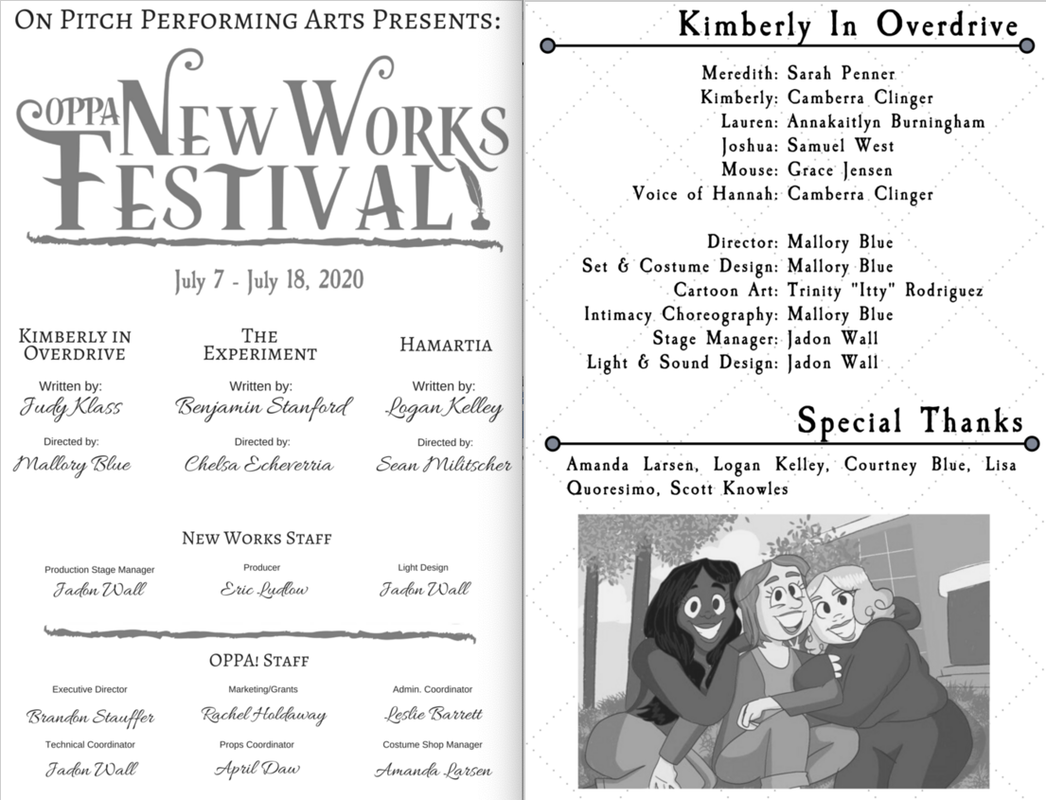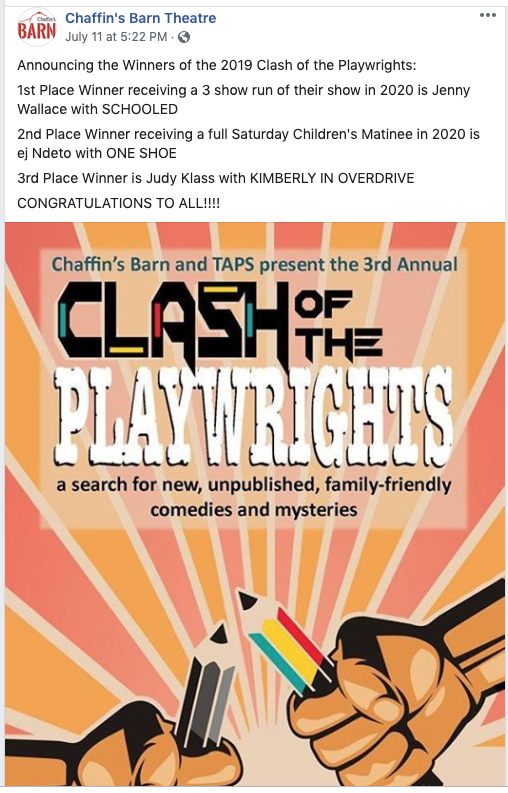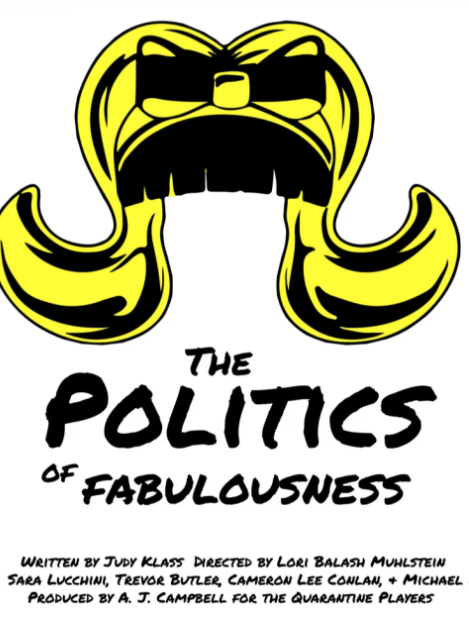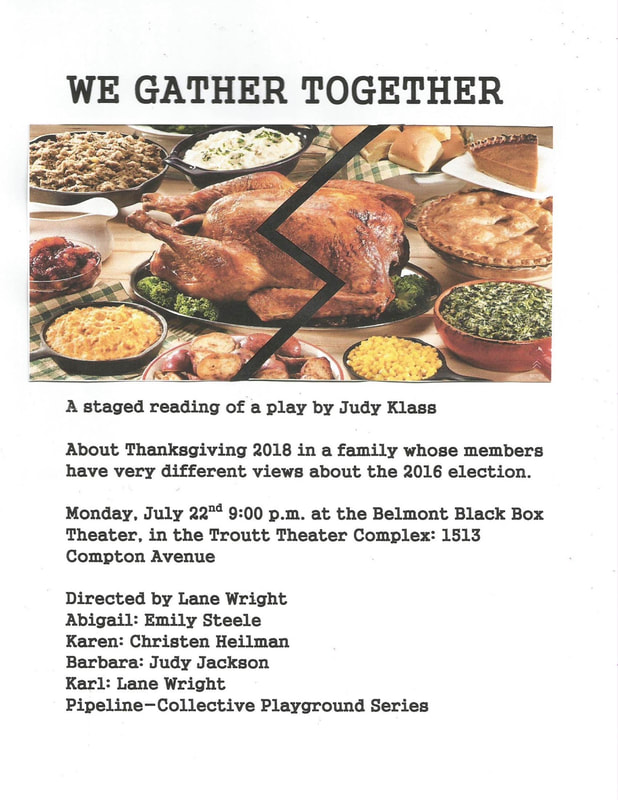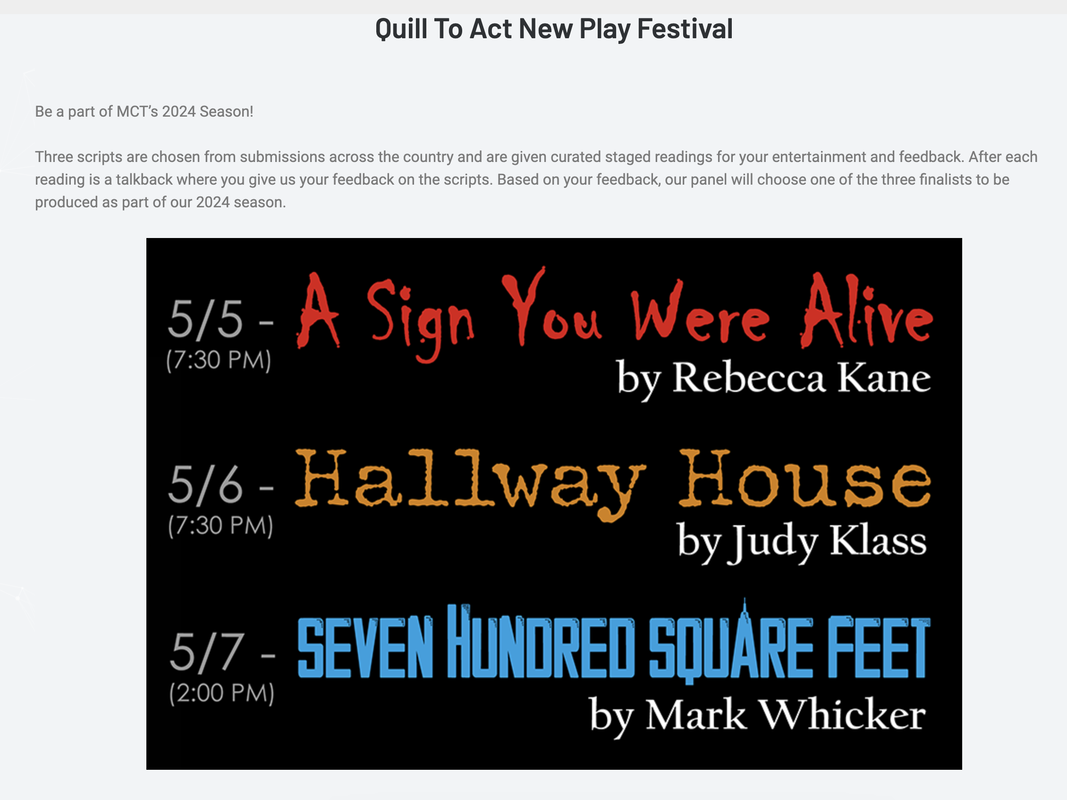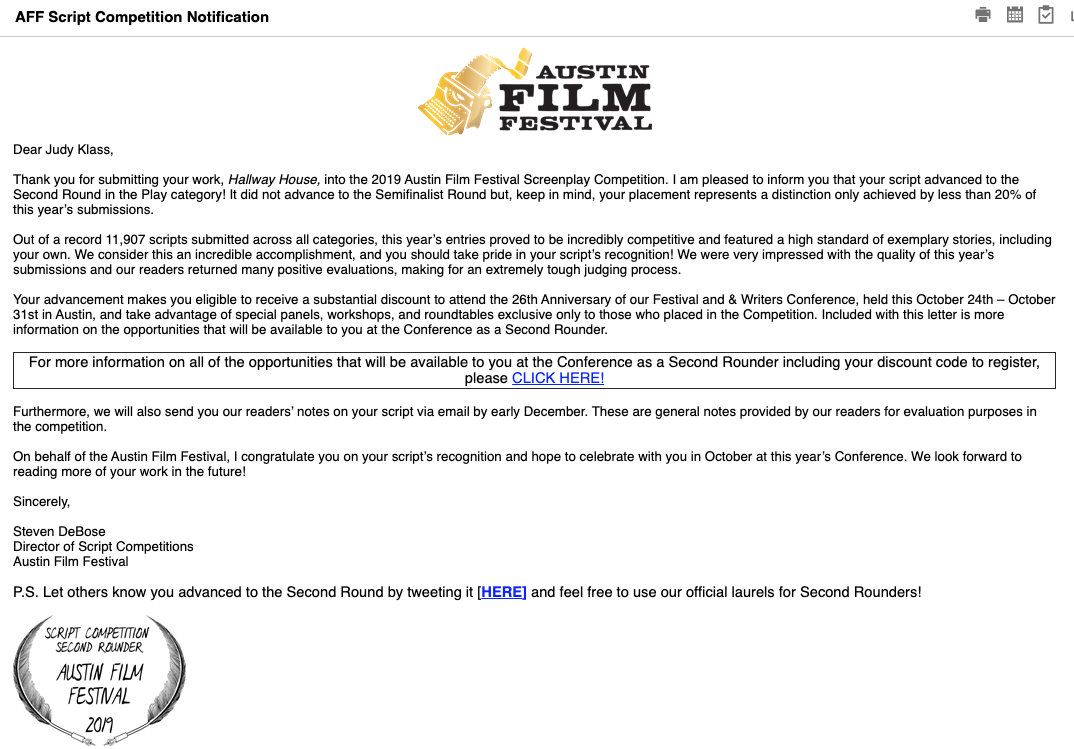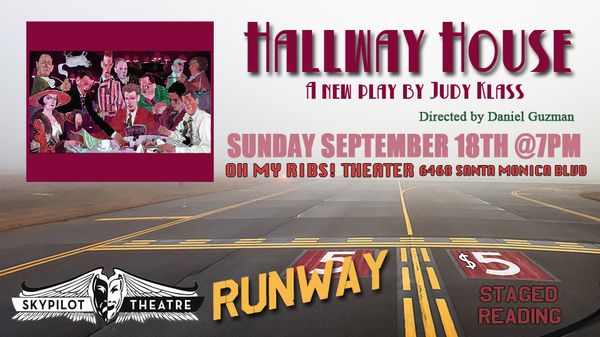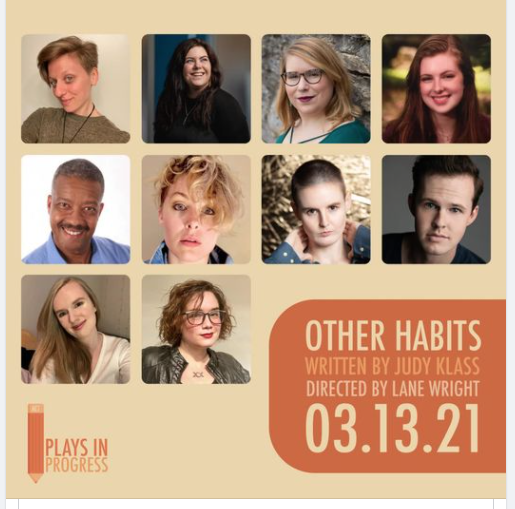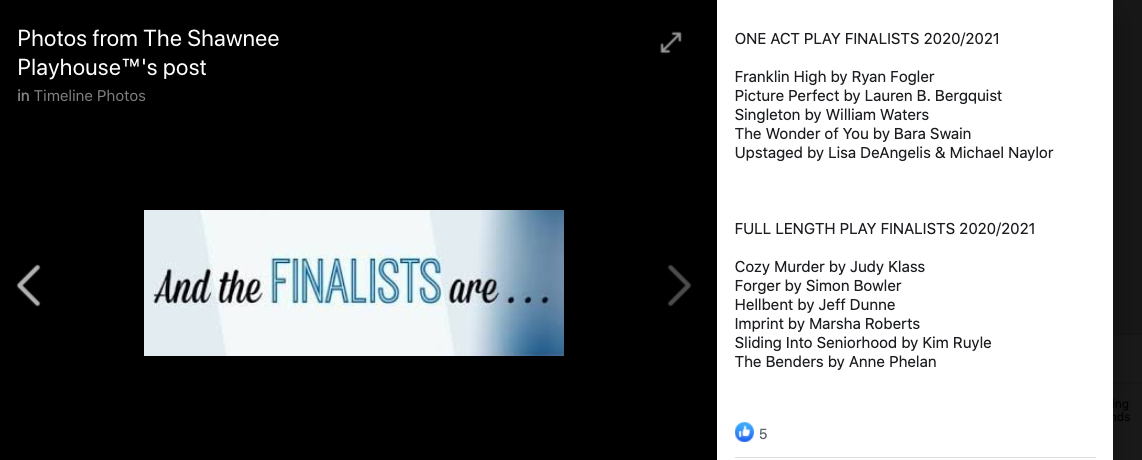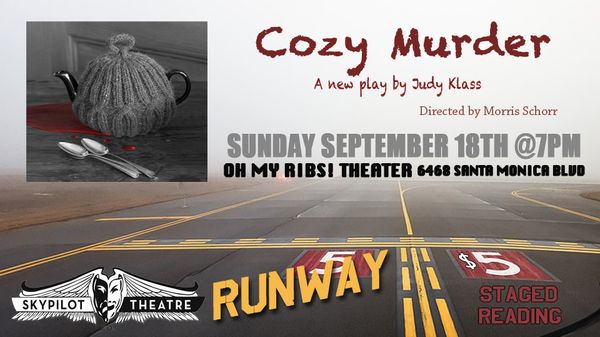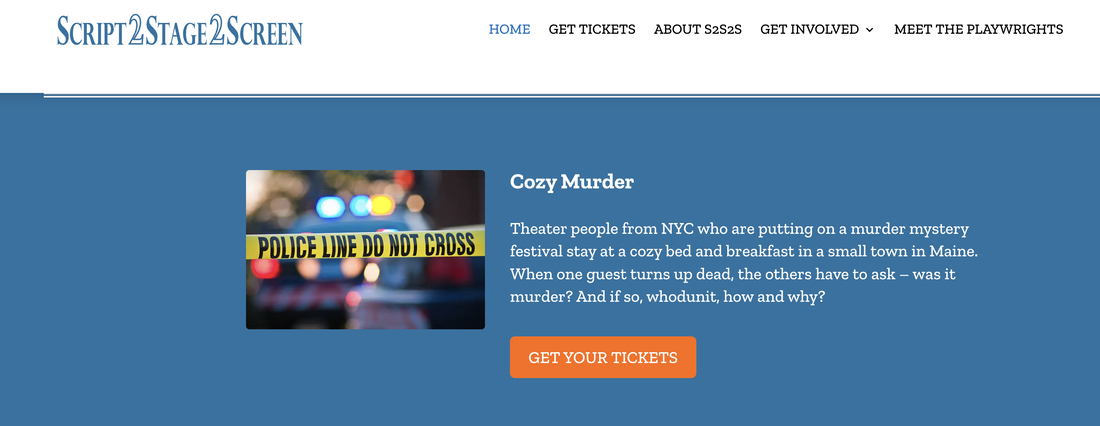PRODUCED FULL-LENGTH PLAYS
TRANSATLANTIC has been produced twice in NYC. It's about the "special relationship" from Hell: the mutual incomprehension and love/hate bond between England and America. Bernie and Lori Greenfield fly to London in Act One. Bernie's indie NYC film company wants to produce Fiona Thorpe's screenplay about eminent Victorians. But Bernie fumes to Lori about the American-bashing he experienced as a Rhodes Scholar. Fiona fumes to her husband Nick about American cultural imperialism. The two quieter spouses try to ease tension when the couples meet, and Bernie and Fiona spar -- or are they falling in love? Left to their own devices more and more, Nick and Lori find more strength, humor and sense between them than they would have imagined. This romantic comedy has four characters. It has been Brit-proofed by Brit friends to be totally "bi-lingual." Monologues from it have been anthologized.Its first production was with Point of You Productions at the Greenwich Street Theatre. Then it won a competition run by The Spotlight Theater Company of William Patterson University in New Jersey. It had a production there which moved to the Producers Club in NYC -- and I (as the Warp & Woof Group, with family backers) then co-produced moving that production to the Independent.
TRANSATLANTIC has been produced twice in NYC. It's about the "special relationship" from Hell: the mutual incomprehension and love/hate bond between England and America. Bernie and Lori Greenfield fly to London in Act One. Bernie's indie NYC film company wants to produce Fiona Thorpe's screenplay about eminent Victorians. But Bernie fumes to Lori about the American-bashing he experienced as a Rhodes Scholar. Fiona fumes to her husband Nick about American cultural imperialism. The two quieter spouses try to ease tension when the couples meet, and Bernie and Fiona spar -- or are they falling in love? Left to their own devices more and more, Nick and Lori find more strength, humor and sense between them than they would have imagined. This romantic comedy has four characters. It has been Brit-proofed by Brit friends to be totally "bi-lingual." Monologues from it have been anthologized.Its first production was with Point of You Productions at the Greenwich Street Theatre. Then it won a competition run by The Spotlight Theater Company of William Patterson University in New Jersey. It had a production there which moved to the Producers Club in NYC -- and I (as the Warp & Woof Group, with family backers) then co-produced moving that production to the Independent.
|
DAMAGE CONTROL has been produced once in NYC, in a festival of political plays. In a Senate race in an unnamed Southern state, Carl Sharp is the brilliant, self-made Democratic candidate -- who is scandal-prone. Bradley LeBland III is the Republican candidate: scion of a prominent Northern family moved to the South, son of a senator -- and a man who has trouble articulating a sentence without a teleprompter. Their respective spin doctors, Debbie Kaufman originally from NYC and Haley Vincent Gaines, the son of an adviser to Brad's daddy, try to keep their candidates out of trouble, and deal warily with a mutual attraction. But what kinds of rumors is the campaign season raking up, and will a secret from from when both candidates were young men at college together derail the careers of both? This political drama (with jokes) requires a cast of eight: six men and two women. Here's a scene from it, directed by Eddie Lew, with Heather Fink and Brad Letson:
|
|
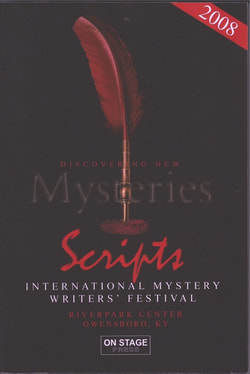
|
CELL was produced by Zev Buffman in the International Mystery Writers' Festival in Kentucky, and it was published in a collection of scripts from that festival. Lt. Rodriguez questions Dennis Kadman about the death of Dennis's physically disabled older brother Michael: How did Michael get access to heroin, and OD? Dennis is heartbroken and baffled; the courts had placed his brother, whom he considered a genius, in his care, and Dennis was trying to keep Michael safe, healthy and drug-free. Rodriguez suspects Dennis, and runs other possibilities by him: Dennis's fiancee Julie who hated how Michael played with Dennis's mind and blighted his life; Edith, the Jamaican nurse who also had a key to the apartment and who felt Michael had a right to die if that's what he wanted; and Byron, Michael's friend from his homeless days. Flashbacks tell the story of this whodunit, and the relationship between two brothers. Michael lost his legs to diabetes, but a wheelchair with holes for the legs makes it possible for an actor with legs to play him.
It was nominated for an Edgar Allan Poe Award, and it is published by Samuel French/Concord: _CELLSamFrench |

HACKERS & HEROES is a play co-written with Ron Reed, produced in NYC once. Al is an unemployed IT guy. His wife Jordana does web design and PR
for a pharmaceutical company. Al is intrigued by Anonymous, Julian Assange, Edward Snowden, etc. Jordana does not find hackers heroic, sees them more as terrorists or juvenile delinquents, and is uncomfortable that Al spends so much time in chans, chatting anonymously. She prefers direct interactions: with her prickly friend Kimberly at work and with a song co-writer. Kimberly tells Jordana that their company is suppressing a study showing its main product causes the cancer that killed Jordana's brother -- and Al decides to hack their computer: creating a crisis in their marriage and lives. This was done with four actors in NYC; it can potentially involve more actors for the dramatized chat room conversations -- which can be surprisingly creepy and effective.
AFTER TARTUFFE was produced in 2015 in the Fresh Fruit Festival in NYC. It is a post-apocalyptic re-imagining of Moliere's Tartuffe, set in a future America that has become a Christian Fundamentalist state. As with Moliere's play, this is not an attack on religion or on all religious people: merely a satire of problematic aspects of religious extremism, commercialism and hypocrisy. The Reverend Chadwick Pusser, a de-frocked, disgraced megachurch pastor is taken in by Oral, a rich, credulous man, and sets himself up as the religious leader of the household. Pusser has the support of Oral's pious mother. Pusser gets himself engaged to Oral's teenaged daughter (to her dismay and the dismay of her real fiancee) while making passes at Oral's wife and gay son Daniel whom he threatens to out. Oral is so taken with the righteousness of Reverend Pusser he cannot hear reason from his son Daniel or from the sarcastic, voluble housekeeper Doreen. Daniel surfs the net and becomes taken with the idea that he and his family are living in a false alternate universe, and if a website called oracle.net would send him a pdf of the original, uncensored version of Moliere's play Tartuffe, things might shift back and he could be with Tyler, the guy he loves . . . This play was published in 2022 online in two installments in the magazine The Courtship of Winds. It is being published in 2023 by Next Stage Press as a hard-copy script.
STOP ME IF YOU'VE HEARD THIS ONE won the Dorothy Silver Award in 2006 as the Best New Jewish Play, and it had a staged reading at the Cleveland Playhouse. The play had two staged reading in Florida: in DeLand and Boca Raton. It had a staged reading at Congregation Dor Hadash in San Diego, California. Alan clashes with his elderly parents and sister after being duped into flying down and attending the family's Passover seder in Florida. He is also exasperated by the not so well concealed efforts to set him up with his sister's au pair girl, who has a secret the family does not suspect. This is a family in which each of the characters argue, attempt to lighten the mood and generally express themselves through telling jokes -- some of them extremely long and shaggy. Alan reconnects with his father, especially, by the end. The play was produced at last in Nashville, in March 2019 after coming in second in a Chaffin's Barn competition. Below are images from two readings and the poster for the production.
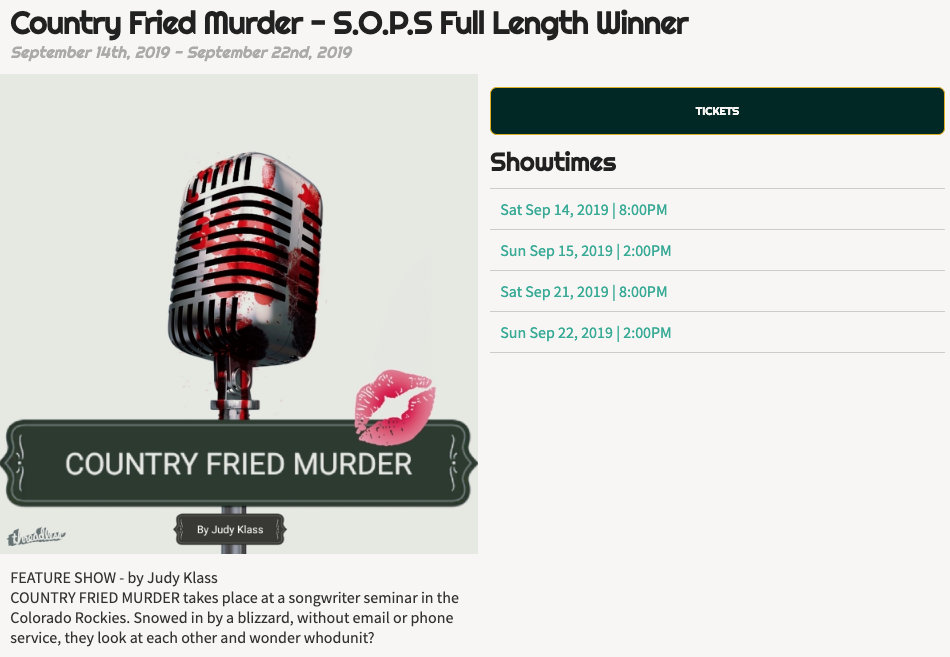
COUNTRY-FRIED MURDER is a play I wrote after CELL appeared in the Mystery Writers' Festival in Owensboro, Kentucky. I think many local people came to the festival for the Agatha Christie and the Sherlock Holmes. My play worked as a whodunit, but in some ways it is only incidentally a murder mystery; it is full of cussing, NYC characters and angst, and I decided to write a more traditional "cozy murder" mystery to submit the next year: something that the good people of Owensboro would enjoy if it got chosen, but which would still be a play of substance. COUNTRY FRIED MURDER was the result. But the recession hit and the festival closed down . . . and now the Edgars don't even have a playwrights' category anymore . . . but the play won in the full-length category in a competition run by the Shawnee Playhouse, and it is being produced at last in September 2019. COUNTRY FRIED MURDER takes place at a songwriter seminar in the Colorado Rockies. Smart, abrasive, charismatic Kyle Samperson is a Nashville country singer/songwriter who is the mentor. But he horrifies Martha, who runs the seminar, by saying he will duck out early and go on a songwriter cruise. He clashes about culture and politics with one attendee, mocks a song by a couple that turns out to be about their child who died, insults an older gentleman's song as hopelessly hoaky and old-fashioned, sleeps with an aspiring young female artist, then discards her . . . and by the time he is murdered at the end of Act One, everybody has a motive. In Act Two, the others discover the body. Snowed in by a blizzard, without email or phone service, they look at each other and wonder whodunit? The play contains some songs and song fragments.
That production got a nomination with the Northeastern Pennsylvania Theatrical Alliance (NEPTA) in 2020 for productions in 2019:
Country Fried Murder had a new, virtual production during the pandemic with Quarantine Players. It has been published by Lazy Bee Scripts in the UK. Since it takes place at a songwriters' seminar, and it contains songs and song fragments, they present it as a musical.
KIMBERLY IN OVERDRIVE was produced in July of 2020 in Layton, Utah -- in an only partially filled theater, with social distancing and masks. It was part of the OPPA! festival of New Works. The play focuses on Meredith -- and how she would rather be Kimberly. Since Meredith was young, she has had fantasies about the adventures of Kimberly who is strong, witty, heroic ... everything Meredith feels she is not. In some Kimberly fantasies, there is a much wussier friend of Kimberly's, a girl named Mouse -- who represents Meredith. Meredith is a college student living in a suite with hard-partying, hungover Hannah (whose mostly mumbled remarks are delivered entirely from off-stage, and the person playing Kimberly or Mouse could play her) and her friend Lauren. Lauren's ex-boyfriend Josh keeps coming 'round, to Lauren's annoyance ... and he and Lauren get caught up in Meredith's brainstorming, as she tries to write a play, and then a screenplay, about Kimberly. Meredith's parents are pressuring her to be pre-law, and she doesn't want to go that route. She's trying to write her way out of the law school hole, and hoping that Kimberly will save her. But sometimes imaginary friends and avatars say and do things beyond our control, and sometimes real life is better than any fantasy. I now call the play ERICA IN OVERDRIVE. It is having a reading this summer in Texas.
In 2019 KIMBERLY IN OVERDRIVE was a Finalist in the TCTC competition in Tyler, Texas. Also in 2019, it came in Third in the Clash of the Playwrights competition at Chaffin's Barn Theatre in Nashville:
UNPRODUCED FULL-LENGTH PLAYS
CROWDED HOUSE began as a longish one-act play, produced in an evening of one -acts at the Looking Glass Theatre in NYC about people trying to enter and leave spaces, called Inside Out. It was produced at the Actors Workout Studio in North Hollywood in another evening of plays called 3 Klass Acts: the West Coast premiere of three of my short plays. People urged me to turn CROWDED HOUSE into a full-length, but I didn't see away to do that and to insert an intermission . . . until I did. It's a comedy/romantic comedy about roommate hell: about how in major cities many single young people are forced to share apartments with strangers into their thirties. John likes his flat-mate Claire -- but what if he makes a move on her and she doesn't like him back? How awkward would that be? The third flat-mate, Ed, is proudly blue collar and conservative; he and Claire argue politics so ferociously, John wonders if there is some kind of secret attraction. Ed and his rich girlfriend Annette are all over each other, all the time, in the cramped, shabby apartment, instead of going to her place, which makes things more uncomfortable for John and Claire. They all get trapped in the apartment, with two college friends of John's who are horrified by how he is now living and with a pizza deliveryman who speaks little English, when the front door gets stuck. Since it's hard to imagine seven people (four men and three women) trapped in a place with no working phone nowadays, I've made the play a period piece, set in the summer of 2001, just before 9/11. It is issues from back then that Claire and Ed bicker about. Things are hot and tense in the apartment, and John realizes that Sartre was right: Hell is other people. But does he have what it takes to stand up to Ed and his college buddy with the shady "tutorial" service, and to go for it with Claire? Four men, three women.
MISSIONARIES has had a reading with gaia studio in Hoboken and came in second in the Tallahassee Writers Association's Project Autumnlight Competition. Sylvia, a non-religious, left-leaning Jewish woman from NYC has come to a small Southern town for the funeral of a college friend. A torrential rainstorm means the buses are not running; she takes shelter in the diner of Mandy, who sold her the bus ticket. Mandy is a local Baptist woman around the same age. She was on her way to a Bible Study group, but she is happy to bring Sylvia along -- or to miss her group and have a conversation about faith with Sylvia; it's interesting to meet someone so different! She is surprised by the hostility with which Sylvia responds. The two women get into a discussion/conversation that spans many sociopolitical/cultural/religious divides in this country. They are from very different worlds, and yet they do find a few ways to connect. The play has been re-vamped for this political moment. Two women, no intermission.
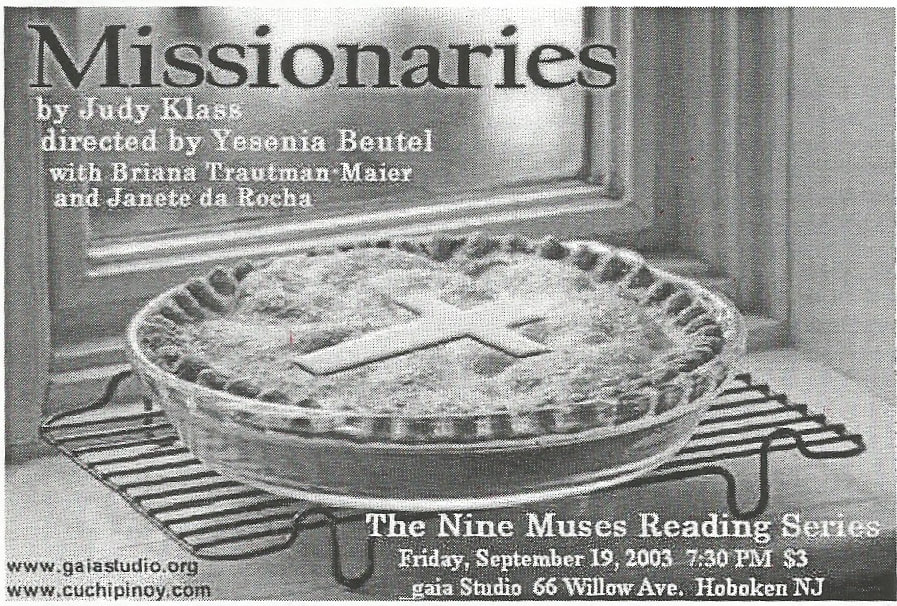
THE POLITICS OF FABULOUSNESS still has not been produced onstage. But in 2021, it was produced as a Zoom recording and podcast by Quarantine Players. It's on YouTube.
|
THE POLITICS OF FABULOUSNESS has four characters. Gary hopes to re-connect with his estranged older sister Kay, who teaches at a small college but is visiting Kansas City, where Gary now lives, for an academic conference. Gary lives with his lover Eytan, who was Kay’s high school best friend, years ago; now Eytan and Kay hate each other. Eytan and Gary write humorous songs which Gary sings as a female character called Ovaria Strange. When Kay learns about her brother’s drag act, she tells them that she considers drag to be misogynist: a caricature of women. Eytan says what he thinks of Kay, who's White, teaching African-American Studies. Kay's Black husband Curtis also weighs in on the issues that are being discussed, though he, like Gary, is more laid-back. Healing among these people is unlikely. In terms of the ideas they discuss, it seems, perhaps, that everyone is right, and everyone is wrong. This play was a Finalist in the Garry Marshall New Works Festival, a Semi-Finalist in the Mario Fratti-Fred Newman Political Playwriting Contest, a NewBorn Fesival Semi-Finalist and a Boomerang Theatre First Flight Finalist. It was a Finalist in 12 Peer Theater's New Play Podcast Series and a Finalist with ART: Acadiana Repertory Theatre in Louisiana. |
TRIANGLE features three characters working on a documentary about how gay men were treated during the Holocaust; the poster for it will feature a pink triangle. Harry is making the film in NYC, and actually looks forward to antagonizing people with it. Nora, an old friend/ex-lover of his, is tracking down permission for pictures included in the film. They hire Luke to re-transfer and re-synch footage. Luke is younger, a southern Baptist who attended Belmont in Nashville. Nora is writing a play about a love triangle, and this play is a bit of a love triangle. Nora is still partially tangled in old feelings for Harry, who is attracted to Luke, who is protective of Nora -- who sees Luke as sweet but very, very young. The play is set in the summer of 2018, and the characters discuss fall-out from the 2016 election. Two men, one woman.
WE GATHER TOGETHER is even more focused on fall-out from the 2016 election. It had a reading in July 2019 with in the Pipeline-Collective Playground Series in Nashville, TN. Barbara has convinced her two grown daughters to come home for Thanksgiving 2018, and to spend it with her and her husband Karl. One daughter, Karen, was a big supporter of Bernie, but gets along fine with her dad Karl, who is a Trump supporter. But Abigail de-friended her sister Karen on Facebook during the 2016 Democratic Convention, and de-friended her father a few months after Trump's victory. Barbara tries to steer the conversation free of political topics. There is so much tension, she finally says people should go ahead and explain their positions to each other. Barbara says their bond as a family should transcend something as silly as politics. But maybe it can't -- and Barbara avoids answering Abby's questions about who Barbara voted for in 2016. Three women, one man.
WE GATHER TOGETHER is even more focused on fall-out from the 2016 election. It had a reading in July 2019 with in the Pipeline-Collective Playground Series in Nashville, TN. Barbara has convinced her two grown daughters to come home for Thanksgiving 2018, and to spend it with her and her husband Karl. One daughter, Karen, was a big supporter of Bernie, but gets along fine with her dad Karl, who is a Trump supporter. But Abigail de-friended her sister Karen on Facebook during the 2016 Democratic Convention, and de-friended her father a few months after Trump's victory. Barbara tries to steer the conversation free of political topics. There is so much tension, she finally says people should go ahead and explain their positions to each other. Barbara says their bond as a family should transcend something as silly as politics. But maybe it can't -- and Barbara avoids answering Abby's questions about who Barbara voted for in 2016. Three women, one man.
I HEARD A RUMOR started life as a screenplay of mine which has done well in competitions -- a script riffing on Shakespeare's play Much Ado About Nothing. I recently wrote a new version: re-conceiving it as a stage play, and bringing it full circle. Bea and Ben are smart, quirky juniors at a small college who heap abuse on each other and bicker whenever they meet. Their friends suspect they are really attracted to each other, and the friends stage two fake conversations to help the pair to acknowledge how they feel. A much nastier practical joke, involving an altered home-made porn tape and cyber-bullying, targets Bea's shy freshman cousin, and when Ben finally talks about his feelings, Bea demands he prove how strong they are by helping her fight back. Seven men, three women. This play is currently a Quarter-Finalist in the ScreenCraft competition in the Play category.
GARDEN PARTY is a play that would entail a cast of seven women. It is currently a Semifinalist in the International Thomas Wolfe competition for playwrights. It takes place in Miss Valerie's garden in a small Tennessee town. It is Callie's bridal shower, but Callie confides in her college friend Erin that several of the women she grew up with, who have roles in the wedding, have been acting oddly. When everyone heads outside and things get weird with those women, Callie has the friendship of Erin, and of Miss Valerie, and Miss Valerie's words of wisdom in her toast, about pollinators' gardens and mulch and planting and decay, and bugs and cycles in nature and citizen scientists, to help Callie get through rough times.
HALLWAY HOUSE made the Second Round of the Austin Film Festival script competition in the play category in 2019. It is about Dianne, Michael and Emily who have been friends since they were all on Hallway B their freshman year at a small liberal arts college. Their senior year, they (and a few other friends) lived in a house off campus that they called Hallway House, since it reconstructed their freshman dorm experience. Now, Dianne is rich from writing romance novels, though she, herself, avoids relationships. She lives on the third floor of a big house and rents rooms, cheap, to old friends when their lives in the real world get smashed up. Emily has recently learned her husband is cheating, and has moved in. Michael has been in this new version of "Hallway House" for two years ... He may be ready to step out. Emily nosily checks out Connor, a younger man Michael brings around, and Dianne eavesdrops from the staircase. But the old friends kind of see themselves as the Algonquin Round Table, and toss out a lot of one-liners from Dorothy Parker, Edna Ferber, Alexander Woollcott, etc. Connor has none of their reference points; this makes Michael feel very old and odd about approaching him romantically. Meanwhile, Emily has it out with Brett, her ex -- and the old friends talk through some grievances they have with each other. There is talk in this play about old Kaufman and Hart screwball comedies, and the play has a trace of the rhythm and the feel of plays like You Can't Take It With You and The Man Who Came to Dinner. Two women, three men. It has had a staged reading with Murphys Creek Theatre in Murphys Creek, California.
GARDEN PARTY is a play that would entail a cast of seven women. It is currently a Semifinalist in the International Thomas Wolfe competition for playwrights. It takes place in Miss Valerie's garden in a small Tennessee town. It is Callie's bridal shower, but Callie confides in her college friend Erin that several of the women she grew up with, who have roles in the wedding, have been acting oddly. When everyone heads outside and things get weird with those women, Callie has the friendship of Erin, and of Miss Valerie, and Miss Valerie's words of wisdom in her toast, about pollinators' gardens and mulch and planting and decay, and bugs and cycles in nature and citizen scientists, to help Callie get through rough times.
HALLWAY HOUSE made the Second Round of the Austin Film Festival script competition in the play category in 2019. It is about Dianne, Michael and Emily who have been friends since they were all on Hallway B their freshman year at a small liberal arts college. Their senior year, they (and a few other friends) lived in a house off campus that they called Hallway House, since it reconstructed their freshman dorm experience. Now, Dianne is rich from writing romance novels, though she, herself, avoids relationships. She lives on the third floor of a big house and rents rooms, cheap, to old friends when their lives in the real world get smashed up. Emily has recently learned her husband is cheating, and has moved in. Michael has been in this new version of "Hallway House" for two years ... He may be ready to step out. Emily nosily checks out Connor, a younger man Michael brings around, and Dianne eavesdrops from the staircase. But the old friends kind of see themselves as the Algonquin Round Table, and toss out a lot of one-liners from Dorothy Parker, Edna Ferber, Alexander Woollcott, etc. Connor has none of their reference points; this makes Michael feel very old and odd about approaching him romantically. Meanwhile, Emily has it out with Brett, her ex -- and the old friends talk through some grievances they have with each other. There is talk in this play about old Kaufman and Hart screwball comedies, and the play has a trace of the rhythm and the feel of plays like You Can't Take It With You and The Man Who Came to Dinner. Two women, three men. It has had a staged reading with Murphys Creek Theatre in Murphys Creek, California.
In 2022, HALLWAY HOUSE had a staged reading with SkyPilot Theatre in Los Angeles. I flew to LA to attend a rehearsal, see the reading and take part in the talk-back with the audience, afterward.
THE YOUNGEST MUSKETEER is a musical. The music for the songs is by Jimmy Borja. A screenplay version of this stage show has won in the Santa Clarita Family Film Festival and the Hollywood Black Film Festival. Jason is an African-American kid living in the projects and attending a mostly white magnet school. He reads The Three Musketeers for class and fantasizes that he is d'Artagnan. His older brother Lamar tells him he is losing his identity and becoming an Oreo. A teacher will not let Jason try out for the role of d'Artagnan in a school play, saying there were no black people in France until recently. Jason's Great Aunt Lucy tells him something his brother and teacher do not know; Alexandre Dumas who wrote The Three Musketeers was black. An old picture she shows him in a book frees Jason to read and dream what he likes.
SENATOR SCROOGE is a musical. Nashville recordings of the songs, minus the reprises, can be heard at this site, under the "More" tab. It is a re-telling of A Christmas Carol by Charles Dickens, since the US is still dealing with Dickensian problems like a huge gulf between rich and poor, debtors' prisons, and people, including children, dying of curable diseases. Eben Scrooge is a right-wing Senator from an unnamed Southern state. He married his wife Janelle years ago because a Senator is supposed to have a wife, but he treats her badly and has little to do with her. He is a bitter, angry man, who rails against the "War on Christmas" on FOX News, but he has little use for ideas about it being a season of peace, charity and good will toward all mankind. He has disowned his nephew Brad for marrying LaTasha, a black woman. He yells about "illegals," but employs Robert Caracho, who is undocumented, because he can get away with paying him very little. The ghost of Senator Jake Marley warns Scrooge about what he is doing with his life. The Ghost of Christmas Past shows him scenes from when he was young, and was damaged by aversion therapy, and gave up his chance of love. The Ghost of Christmas Present shows him his nephew's holiday party, where LaTasha sings/raps about Brad's uncle and his "Scroogenomics," and the Caracho family Christmas dinner, including little Timonito who is sick and cannot get treatment, and Scrooge's wife Janelle drinking and singing a song from when she dreamed of a career in country music. The terrifying, silent Ghost of Christmas Future shows Scrooge how he'll be remembered by reporters, constituents and colleagues -- unless he changes. He wakes up a different man. The show had a reading at Emerging Artists in NYC in 2019. There is a large cast with room for double and triple-casting. Email me at [email protected], and I can provide unlisted email links to more material.
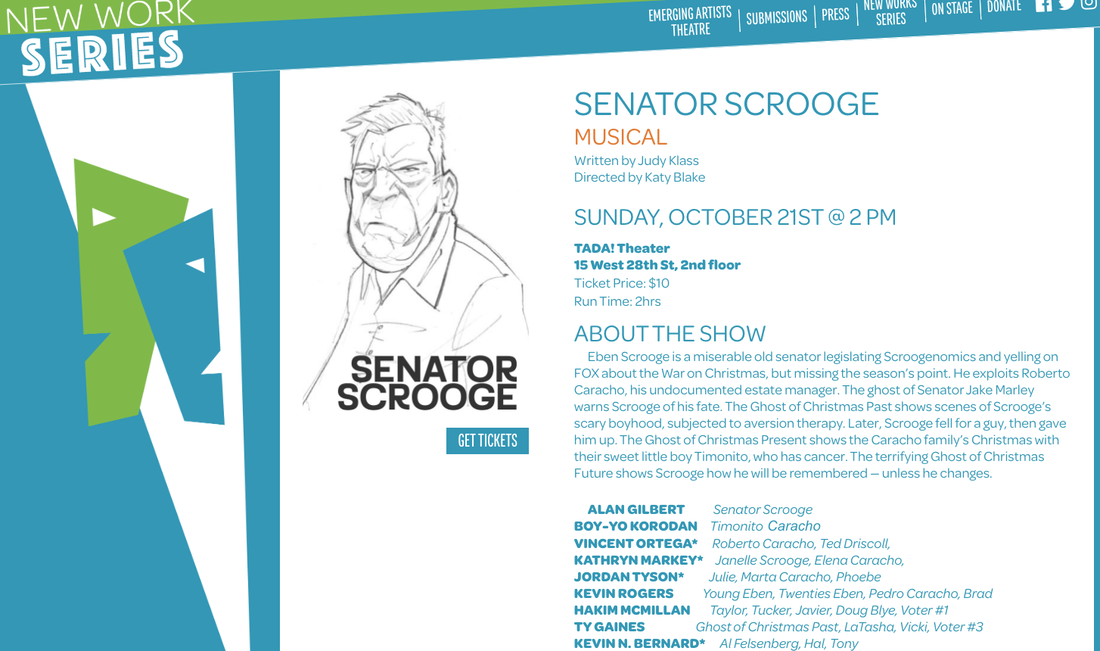
DELIBERATE FOOLS, like I HEARD A RUMOR, is a play that is in conversation with a Shakespeare play -- in this case with The Merchant of Venice. Debbie Raskin teaches courses on Shakespeare and on Jewish Humor at a college. She's navigating a new relationship and talking to the new guy in her life, a driver of trucks and vans, about The Merchant of Venice, and Shylock and the Blood Libel, and whether the Dark Lady of the Sonnets was the Converso woman Amelia Bassano. But meanwhile, it's a tricky time to be teaching a Jewish Humor course that includes former Senator Al Franken and works by Woody Allen. Debbie believes she can doubt that those men have ever been sexual predators and still be a feminist. But some other people aren't so sure ... Five women and four men.
OTHER HABITS is another play in conversation with a Shakespeare play -- with Twelfth Night. It was a Semifinalist in 2019 in the Shakespeare's New Contemporaries competition. Viridian and Teal are therapists in a future society in which almost all people are no longer either male or female. Fetuses are treated with genes from hermaphroditic fish, and children grow up without a fixed gender. Viridian and Teal must evaluate a couple that wants the fish genes removed; they have lived as a man and a woman for years, and wish to be “frozen” in those genders. Viridian and Teal must determine, for the state, if the binary couple is sane. Viridian cannot understand why anyone would want to go back to the Dark Ages before gender fluidity, when there was so much more crime, cruelty, mental illness, addiction ... Viridian loves Umber, who has stress at work also, directing Shakespeare’s Twelfth Night on the main stage of a big theater, but Hibiscus, who gave Umber that job, wants to impose an interpretation on the production. Umber writes a play for the theater to present in its black box: a play in which actors playing Viola and Olivia in Elizabethan times are really girls disguised as boys (or, in the case of Viola, a girl playing a boy playing a girl playing a boy) and fall in love with each other as they rehearse scenes from Twelfth Night. Umber writes in a role for Hibiscus as Will Shakespeare, watching them rehearse, moved by their androgyny as Shakespeare was moved by the young man in the sonnets. Act 1 in Nashville has given this play a reading over Zoom.
COZY MURDER takes place in a B&B in a small town in Maine where there is a mystery play festival every summer. Trevor Connelly is the actor/director who puts on the festival. He can be difficult and overbearing toward Rowena, who owns the B&B, and and perhaps a bit toward Emma, a playwright who will have a play in the festival, and others; his friend Morris smooths things over for Foster when he causes a scene. Geraldine, a former actress, is staying at the B&B and writing a piece about when she knew Trevor years ago -- and #MeToo issues came up. Rowena's daughter Lily stops by; she also had a bad experience with him in the past. Sandy, a tourist from Atlanta, thinks Foster is charming, and when he turns up dead, before there is an autopsy, the local cop says that Trevor has mostly likely died of natural causes. Others are doubtful because a number of people had a motive to kill him -- and because there was a tea cozy on the face of the corpse when it was found. Five women, three men. COZY MURDER was a Finalist in the 2020 S.O.P.S. competition run by the Shawnee Playhouse in Pennsylvania:
COZY MURDER had readings over Zoom with States of Play and Town& Country Players in Pennsylvania, as part of its Signature Series, and it also had a staged reading with SkyPilot Theatre in 2022 in Los Angeles, an event for which I flew to California. It had another staged reading in February 2023 with Script2Stage2Screen, in Rancho Mirage, California.

My new musical HIGH SCHOOL ANTIGONE was a 2024 Finalist in the Waterworks Festival, which is held by Live Arts in Virginia. It was chosen out of more than 600 scripts. It's a full-length musical with nine characters, and it would be easy to stage. Arabella is a high school drama teacher. She has chosen what she sees as a tame, bland musical to produce, but the new right-wing school board shuts it down mid-rehearsal, upsetting the student actors. Arabella's wife Lillian agrees that their once-sleepy small town is getting partisan and scary. Lillian suggests that Arabella and the kids in her songwriting class turn Antigone by Sophocles into a musical. A strong young woman plays Antigone, the son of the school board rep plays Kreon and bases the character on his thin-skinned father ... and the question is whether the board will allow the show to move forward.
I wrote lyrics for the songs in the new musical MUSHKY & MO. It had a reading at the Actors' Temple in NYC in the summer of 2024:

